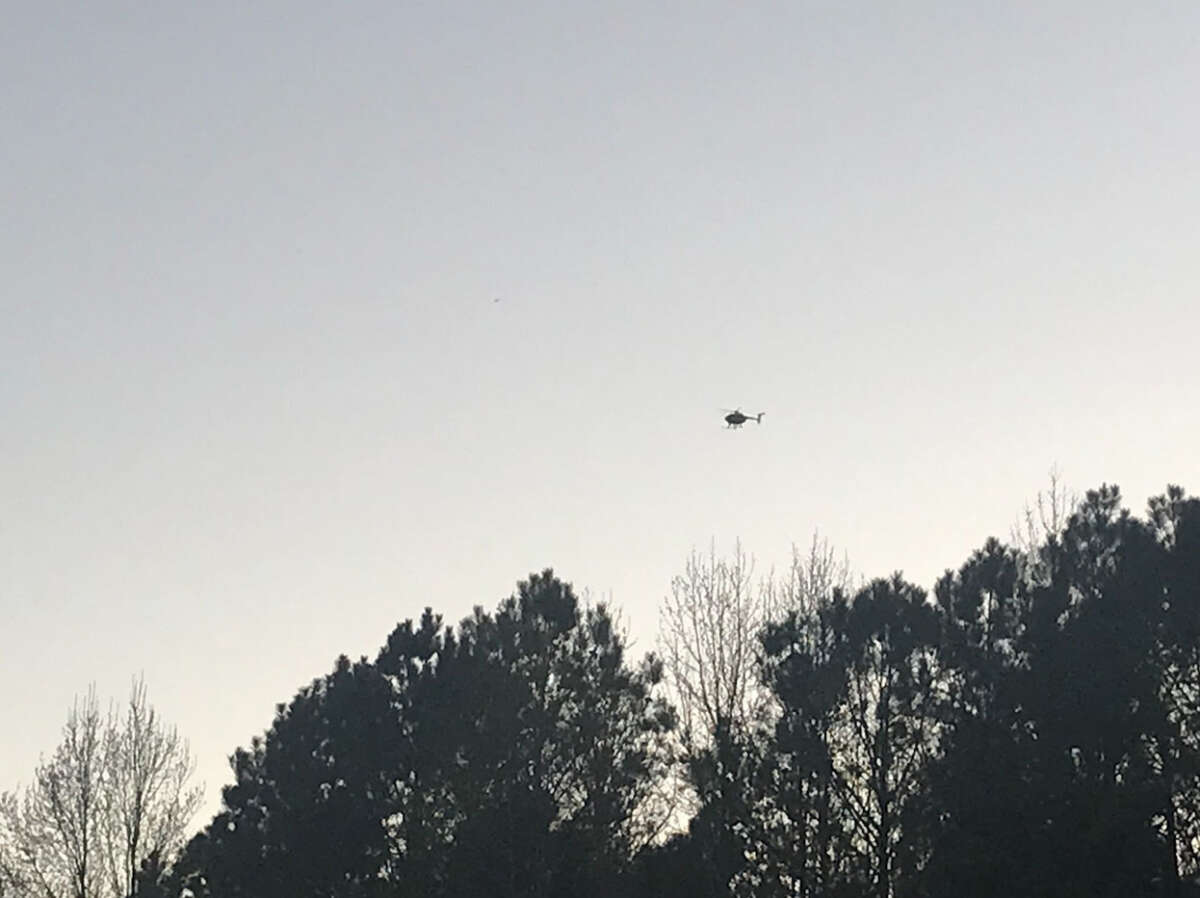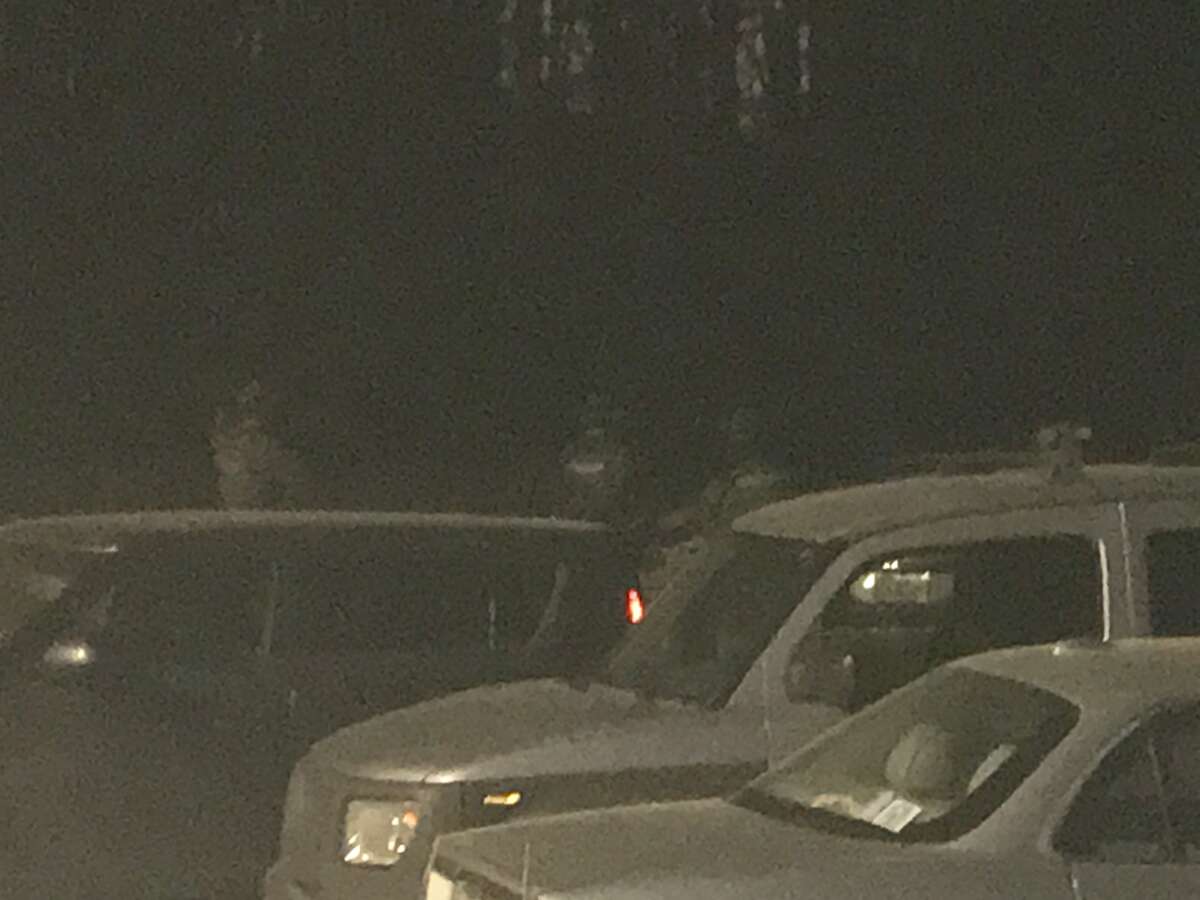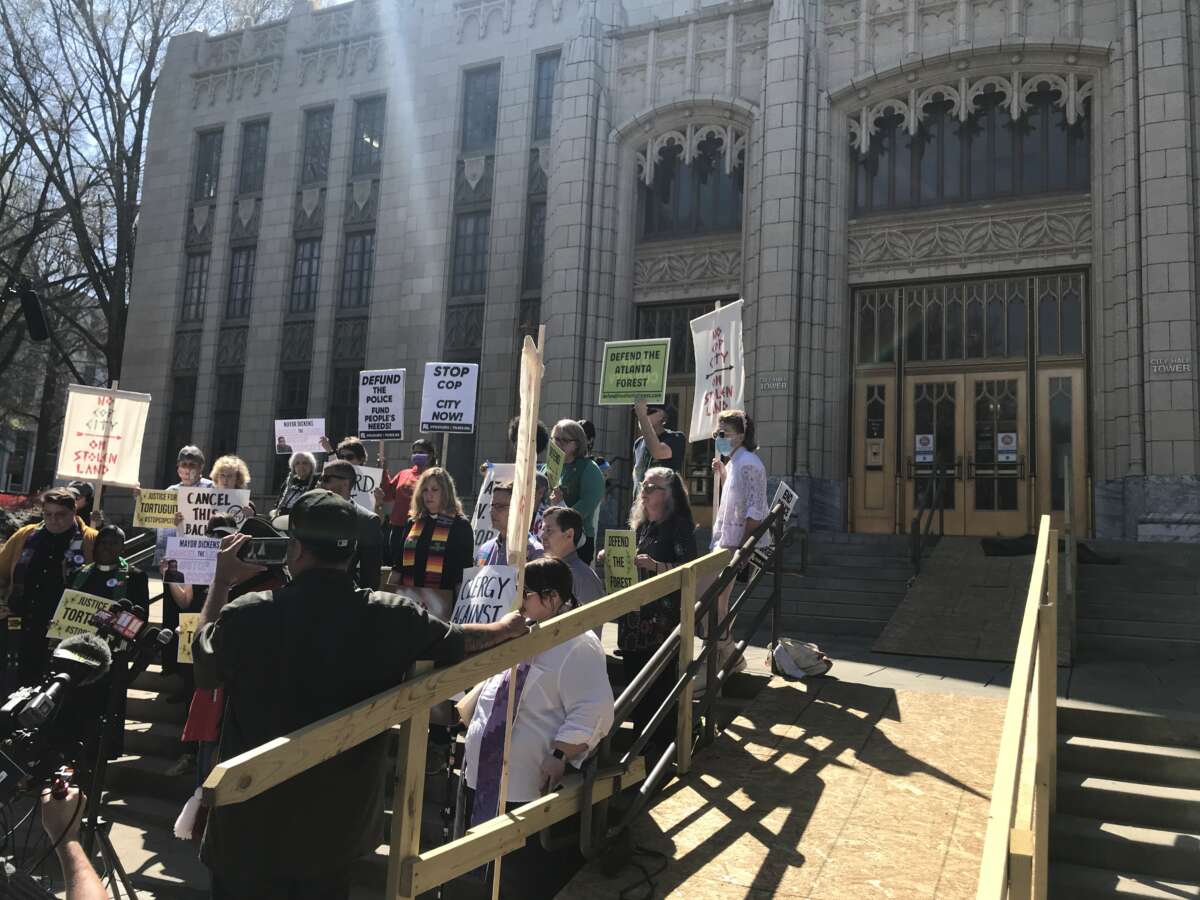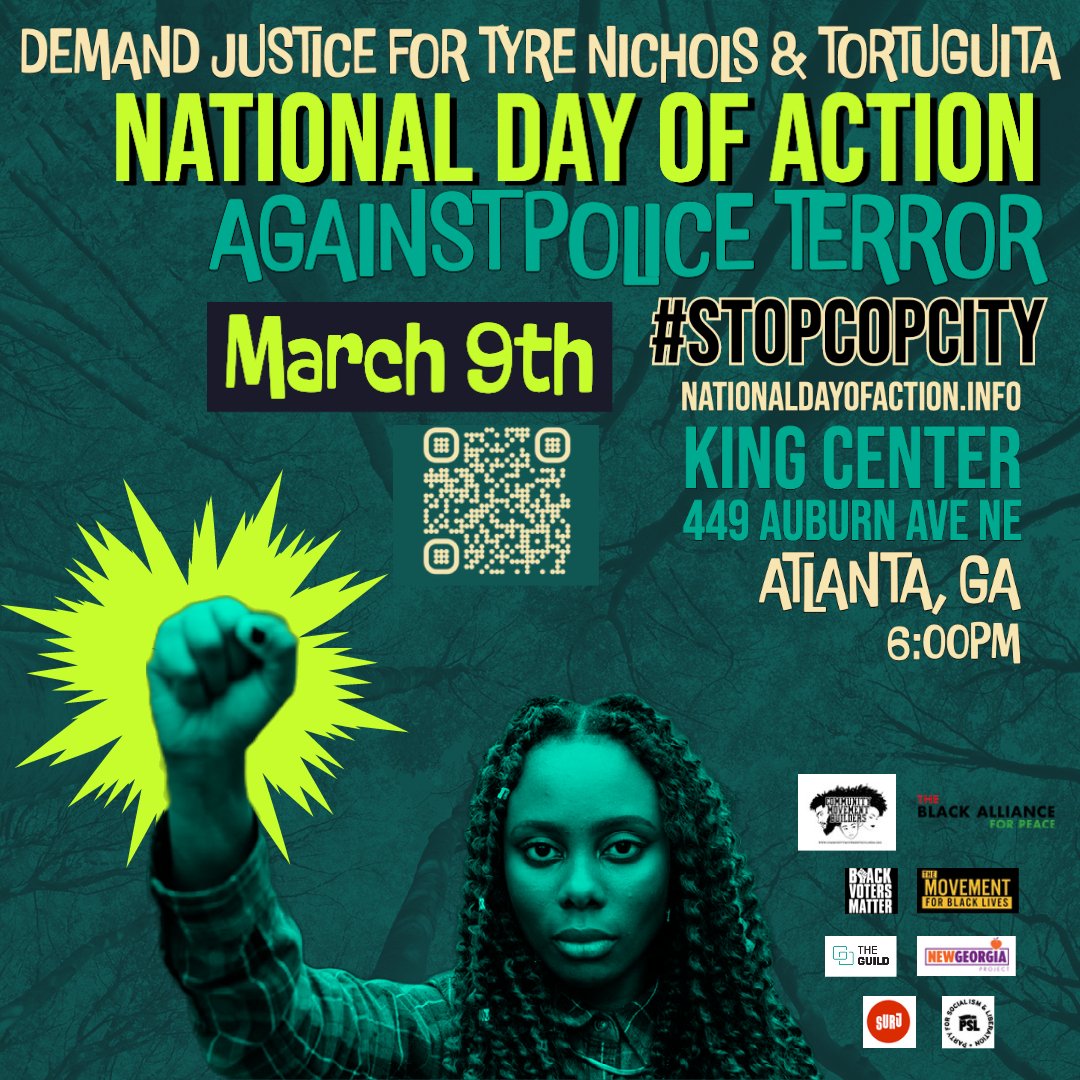In the early evening of March 5, a noxious plume of black smoke wafted over the proposed site of the unpopular Atlanta Public Safety Training Center, known as “Cop City.”
Construction equipment and vehicles were reportedly set on fire, igniting an incendiary response by police on the second day of the Week of Action called by the Defenders of the Atlanta Forest. It was the fifth such week-long event since they learned of the plan to build Cop City in 2021, and the first since forest defender Manuel Esteban Paez Terán was killed on January 18 by a Georgia State Trooper.
Also known as Tortuguita, Terán was the first environmental activist to be killed by police in the United States. Frontline organizers put out an urgent call for a diversity of tactics in a mass mobilization to honor the 26-year-old who was hit with 12 or 13 bullets according to the autopsy, timed to affect the approval of the project’s final permits.
As dusk fell over the forest, multiple police helicopters buzzed above, their searchlights scanning the woods. Many dozens of police vehicles surrounded the area, blue lights flashing and sirens blaring. The Atlanta Police Department (APD) closed Bouldercrest Road leading to Intrenchment Creek Park dubbed by the movement as “Weelaunee’s People’s Park” in homage to the land’s Indigenous Muscogee (Creek) inhabitants, who were forcibly relocated to Oklahoma in the 1830s.


As a reporter who was present when the police surrounded the area, I personally witnessed officers pouring into the forest with hand-held spotlights, dragging people out of the forest, pinning them to the ground and placing their hands behind their backs in zip ties. APD officers and state troopers in camo overran the campgrounds and parking area, issuing commands, chasing people down, weapons drawn, threatening people with arrest and shooting. Much of the activity was caught on video. “Come forward with your hands up,” an officer is heard shouting, “or you are going to get shot. I don’t know how else to put it, you’re going to get hit with a bullet.”

Police controlled the exit from the parking lot, commanded people to leave, but then cuffed and detained them when they tried to walk out. About 500 yards away from the parking lot, audience members at a family friendly music festival featuring dozens of local bands were cornered with their children as troopers with long rifles searched the area, one entering a Bounce House leading with his rifle pointing inside. Concert goers holding their frightened children joined hands and chanted, “Let us go home, let us go home.”
By the end of the night, 35 people were detained, 23 of whom the Georgia Bureau of Investigations have charged with domestic terrorism, a felony that carries up to 35 years in prison.

“The usage of terrorist enhancement laws against protestors is a calculated political maneuver to silence widespread opposition to the Cop City project,” Defend the Atlanta Forest said in a December press release. “The GBI knows that these charges will not hold up in court, and they are not intended to: the point is to raise the stakes of protesting.”
Micah Herskind, a public policy associate with the Southern Center for Human Rights, told the Atlanta City Council in a public comment yesterday, “We’ve seen sweeping repressions, mass arrests, overzealous criminal prosecutions and over 40 people have been charged with domestic terrorism, many for things that amount to no more than criminal trespass. …You can recognize that that on its face is ridiculous. Charging protesters who are part of a social movement with domestic terrorism is a dangerous sign of where things are going when it comes to police repression of our movements.”
One of those charged is a staff attorney at the Southern Poverty Law Center who was serving as a National Lawyers Guild legal observer, easily identifiable by his chartreuse cap. He is expected to be released from the DeKalb County Jail after the 1 p.m. bond hearing on March 7.

Nineteen other forest defenders received domestic charges during December and January.
At one point I was personally threatened with arrest by an officer who, noting my out-of-town license plate, said, “Don’t you know it’s a felony to travel from another state for a protest?” The officer ordered me to leave the area, but other people attempting to leave were being detained and cuffed, which the officer admitted was true. He said that if I left in my vehicle, I would not be arrested.
If constructed, the Cop City project would consume 85 acres of Atlanta’s last remaining pristine forest, 50-60 acres of which would be covered with blacktop. The center would host a shooting range, observation tower, and a mock village with a replica of a school, gas station, bar, nightclub, homes, low-rise and high-rise apartments, and a warehouse for the purpose of practicing raids in realistic urban conditions.
The $90 million complex, which will take a big bite out of the city’s last standing forest known as “the lungs of Atlanta,” is facing widespread and sustained community dissent. Opponents include community members and organizations, faith leaders, Muscogee tribal members hoping to one day return to their homelands, and environmental NGOs, such as the Sierra Club and the Center for Biological Diversity, who fear for the degradation of the air, soil and water from munitions and fire retardants to be used during “trainings.”
The project is structured as a public-private partnership between the City of Atlanta and the Atlanta Police Foundation (APF), with the bulk of the financing contributed by corporate donors through their philanthropic foundations. APF has received pledges of seven- and eight-figure contributions, the largest of which is a $13,000,000 donation from the Robert Woodruff Foundation, whose namesake ran the Coca-Cola corporation from 1923 to 1985. The Coca Cola representative, however, resigned from the APF’s board in April 2022, bowing to public sentiment. The Coca-Cola Foundation, though, has continued contributions to the APF, giving $1,000,000 in 2022.
On Monday, a coalition of local faith leaders held a press conference on the steps of Atlanta City Hall decrying the raid, the arrests and domestic terrorism charges “as an example of the militarization that we are calling out, and as people of faith and moral conscience we say, no more.” Members of the coalition read a letter, subsequently delivered to the Atlanta City Council, calling for “a complete stop to the Cop City project, and the cancelation of the Atlanta Police Foundation’s lease.”


Actions and activities are planned all week, including a National Day of Action Against Police Terror on Thursday, which has been endorsed by Community Movement Builders, Black Alliance for Peace, The Movement for Black Lives, Black Voters Matter, The Party for Socialism and Liberation, Cooperation Jackson, Extinction Rebellion, and others.

Angry, shocked, overwhelmed? Take action: Support independent media.
We’ve borne witness to a chaotic first few months in Trump’s presidency.
Over the last months, each executive order has delivered shock and bewilderment — a core part of a strategy to make the right-wing turn feel inevitable and overwhelming. But, as organizer Sandra Avalos implored us to remember in Truthout last November, “Together, we are more powerful than Trump.”
Indeed, the Trump administration is pushing through executive orders, but — as we’ve reported at Truthout — many are in legal limbo and face court challenges from unions and civil rights groups. Efforts to quash anti-racist teaching and DEI programs are stalled by education faculty, staff, and students refusing to comply. And communities across the country are coming together to raise the alarm on ICE raids, inform neighbors of their civil rights, and protect each other in moving shows of solidarity.
It will be a long fight ahead. And as nonprofit movement media, Truthout plans to be there documenting and uplifting resistance.
As we undertake this life-sustaining work, we appeal for your support. We have 10 days left in our fundraiser: Please, if you find value in what we do, join our community of sustainers by making a monthly or one-time gift.
